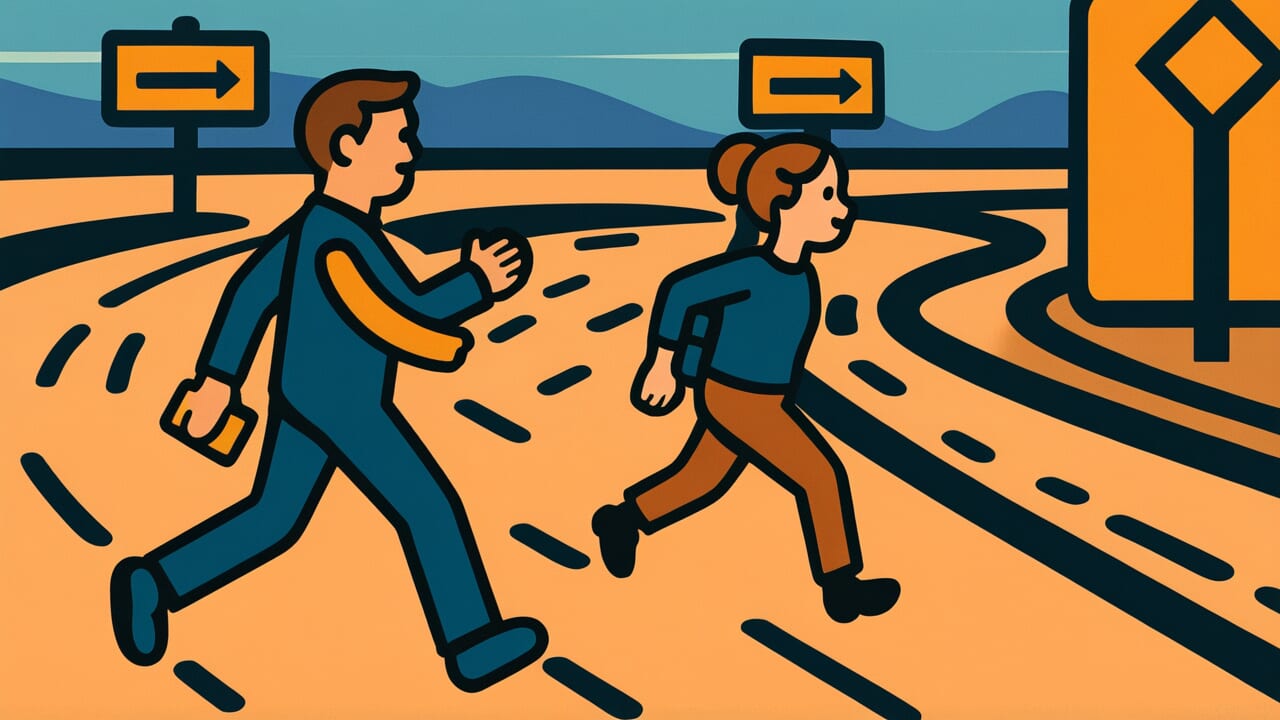How to Read “Hasty travel leaves no good tracks”
Shikkō ni wa zenseki nashi
Meaning of “Hasty travel leaves no good tracks”
This proverb teaches that rushing through things won’t bring good results. When you act in a hurry, your attention gets scattered. You overlook important details. In the end, you produce low-quality work.
People use this saying when advising someone who’s rushing through their work. It also warns against making hasty decisions. You might hear it when a project fails because people rushed it.
It applies when someone tries to handle a task too quickly when they should take their time.
This proverb matters even more in today’s fast-paced world. When we focus too much on speed, we skip necessary steps. We move forward without thinking things through properly.
This actually wastes time because we have to go back and fix mistakes. The proverb reminds us to balance speed with careful work.
Origin and Etymology
This proverb likely comes from the ancient Chinese text “Han Feizi.” This book was written around the 3rd century BCE. It contains teachings about law and governance.
The text includes the phrase “hasty travel leaves no good tracks.”
“Hasty travel” means moving quickly. “Good tracks” refers to beautiful footprints. The saying creates a visual image: when you walk fast, your footprints become messy and irregular.
In ancient China, the appearance of footprints meant more than just looks. Neat, orderly footprints showed a calm mind and careful behavior.
Messy footprints revealed haste and carelessness.
This philosophy traveled to Japan and became a popular proverb. Japan already had a similar saying: “if you’re in a hurry, take the long way around.”
But “Hasty travel leaves no good tracks” is more specific. It warns that rushing produces poor results.
The proverb’s brilliance lies in its concrete imagery. Everyone understands footprints. Through this simple image, it teaches about the quality of our actions in life.
Usage Examples
- I rushed to finish my presentation overnight, but hasty travel leaves no good tracks—it was full of typos and my boss got angry
- Instead of cramming before the exam, study a little each day. Remember, hasty travel leaves no good tracks
Universal Wisdom
“Hasty travel leaves no good tracks” reveals a deep truth about the relationship between rushing and quality. Why do we hurry? We feel anxious about time. We want results quickly. We fear waiting.
But this proverb teaches a harsh reality: speed and quality don’t always go together. Human cognitive ability has limits. The more we rush, the more our attention scatters. Our judgment gets worse.
This isn’t just a modern problem. Ancient people experienced the same human limitation.
What’s interesting is that the proverb doesn’t say “don’t rush.” It points out that good results won’t remain. Rushing itself isn’t condemned.
Instead, it asks us to look carefully at what we lose when we hurry.
Our ancestors understood something important. Truly valuable things in life require time and careful effort. Skills, relationships, trust—none of these can be built overnight.
This truth never changes, no matter how much the world evolves.
When AI Hears This
When you run fast, your footprints become shallow. This is exactly a “sampling rate” problem in information theory. The number of times your foot contacts the ground per unit of time decreases. The amount of recorded information physically drops.
This works just like digital music. When recording sound, measuring 44,100 times per second gives CD quality. Fewer measurements mean worse sound quality.
Fast runners have shorter ground contact time. Pressure gets distributed. Less information remains compared to slow walkers.
In other words, double your speed and you can leave less than half the information on the ground.
AI image recognition faces the same trade-off. To increase processing speed, we lower image resolution. This reduces recognition accuracy.
Self-driving cars detect objects less accurately at high speeds. There’s a limit to how much information can be processed within the available computation time.
What’s fascinating is that this trade-off is an unavoidable physical law. Information processing always costs time. If you demand speed, you must sacrifice some detailed information.
Ancient people grasped this truth through experience. Modern information science now proves it with mathematical formulas.
Lessons for Today
Modern society praises “speed” too much. Instant replies, quick decisions, fast promotions. But “Hasty travel leaves no good tracks” gives us courage to pause and think.
If you’re being chased by something right now, take a deep breath. Do you really need to finish it immediately? What are you sacrificing by rushing?
Sometimes it’s okay to choose careful progress, even if people think you’re slow.
This lesson matters most in relationships and personal growth. Trying to build trust quickly creates distrust instead. Rushing to learn skills leaves your foundation weak.
Slow but steady, valuing each step—this is ultimately the fastest and surest path to your goal. The “good tracks” that remain in your life are carved when you walk carefully, without rushing.



Comments